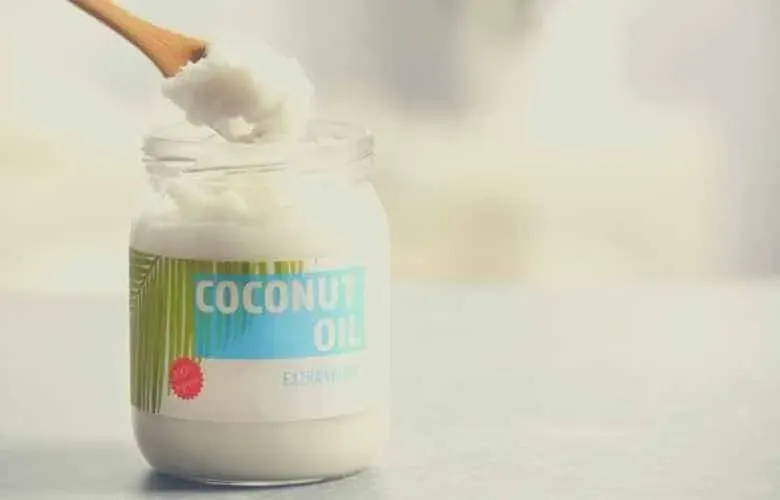
The coconut oil hype has been going on for a long time. It is consumed by millions worldwide or applied topically to skin conditions. Many people also want to make the lives of their pets better with this oil. In my article, I go a little against the consensus that coconut oil is healthy for dogs. There will also be studies to help me with this, which I will of course link to.
Let’s start!

What is Coconut oil?
As its name suggests, coconut oil is extracted from mature coconuts. More specifically from the meat of the harvested coconut. There are many uses of this oil. The food and beauty industries also make a lot of products from it.
Coconut oil consists of about 90% saturated fats. That alone would not give rise to its popularity. However, most of these fats are Medium Chain Triglyceride (MCT for short). Although saturated fats are generally unhealthy, MCTs are considered good fats. For example, they are excellent sources of energy.
Components of coconut’s MCTs include lauric acid, capric acid, and caprylic acid. All three acids are known to have antibacterial or antifungal activity. In addition, we also find a number of monounsaturated and polyunsaturated fatty acids in coconut oil.
Why do many people think coconut is beneficial for dogs?
In fact, the benefits listed below will be the merits of MCTs. Let’s look at these:
Weight loss
Obesity is extremely common in dogs living in modern environments. This can have a number of health consequences. Examples include diabetes, insulin resistance, high blood pressure, joint problems, respiratory difficulties, or liver disease.
MCTs can help balance the thyroid gland. This will help your dog lose weight. MCT oils can also help with weight gain and at the same time reduce excess body fat. In addition, they provide instant energy, increasing performance, and endurance.
Injuries, skin and coat
MCTs have been shown to be effective against a variety of infections. They have antimicrobial, antifungal, and antiviral properties. If you want to disinfect a wound or cut, this is a great natural way. MCTs are also excellent for injuries caused by chewing or scratching due to allergies.
In addition, coconut oil also has a moisturizing effect. Therefore, you can also apply it to the dry, itchy skin of your dog.
Improved cognitive function
MCTs provide energy to the brain in the form of ketones. Therefore, they are able to support brain function in old dogs. It also reduces the chances of developing dementia in the long run.
In addition, MCTs help treat problems such as seizures and chronic inflammation.
Break down process
What even makes MCTs special is the way the body processes them. Most fats consist of LCT (Long Chain Triglycerides). LCTs take longer to break down. Once broken down, they get into the blood and will be stored as fat. Only some of them go on to the liver to be converted into energy.
In contrast, MCTs are rapidly absorbed into the liver through the bloodstream after break down. The liver converts them to ketones. Ketones can be utilized by the liver in many ways, such as feeding cells, digesting, or detoxifying. But they are also returned to the blood to be used by the brain and body as a source of energy. The body does not store them as fat, so MCTs are great supplements in a dog’s diet. This is a great way to avoid obesity.
Then what could be wrong with coconut oil?
To find out, we need to look at how much MCT oil coconut oil contains. The rate is roughly 66%, so two-thirds. That sounds great, but half of that is lauric acid. This is a problem. Although this acid is considered an MCT, unfortunately, it doesn’t quite work that way.
More about lauric acid
Lauric acid (which has 12 carbon atoms), once broken down by the body, travels the same pathway as LCTs. So it is more likely to be stored as fat, unlike MCTs.
Around the 70s, palm oil and coconut oil became very popular. Several industries have been built on them, (and this popularity continues to this day). Researchers at the time called the 12 carbon atoms also a medium-chain. This is why lauric acid is still considered an MCT even though it behaves quite differently.
So you can see that coconut oil is officially a high source of MCT. But the reality is not that. It contains half as many “good” MCTs as advertised. You may now be thinking of giving your dog a larger amount of coconut oil to take advantage of its positive effects. Unfortunately, the situation is not that simple.
Saturated fats
As I mentioned, about 90% of coconut oil is made up of saturated fats. You probably also know that many researchers say these fats are unhealthy for humans. They raise the LDL cholesterol level, and that can lead to various health problems, such as heart disease. But what about dogs?
There are some studies available that show that coconut oil is very harmful to dogs. I will detail these in the following.

Research and studies on coconut oil and dogs
- Coconut oil irritates the gut lining and can also cause diarrhea, loose stools, and upset stomach. Recent research has shown that it can cause inflammation and leaky gut.
The leaky gut means that the spaces between the epithelial cells in the gut widen. In this case, these cells are unable to control what enters the bloodstream from the gut. I guess I don’t have to say how dangerous it is to health when undigested food particles or bacteria get into the blood. - Coconut oil increases the amount of lipopolysaccharide (LPS) in the blood. It is a dangerous endotoxin found in the cell walls of certain intestinal bacteria.
- In addition, the lauric acid in coconut oil kills gram-negative bacteria that have LPS in their cell walls. LPS can then spread through the body without the leaky gut.
So should I give coconut oil to my dog?
I don’t want to ban you from using coconut oil. Based on the studies in my article, I will definitely not give my dog coconut oil. Moreover, I also will not consume it anymore.
The question arises as to why coconut oil is so popular after all.
The answer is not simple. On the one hand, it can be explained by the fact that lauric acid is also classified as an MCT. On the other hand, the good MCTs found in coconut oil do have positive effects. But a lot of people are unaware of the possible consequences (just as I was unaware too).
Third… Coconut oil is most promoted by the coconut oil industry. Of course, this is the case with all industries. People tend to believe in advertisements and commercials, especially when it comes to food and nutritional supplements.
Can I give my dog MCT oil?
Yes. If you want your dog to get the benefits of coconut oil without the potential disadvantages, use MCT oil. In many cases, this is extracted from coconut oil, so be careful not to contain lauric acid. Remember, lauric acid is also officially considered an MCT. And don’t forget that that acid is one of the reasons why coconut oil isn’t a very lucky choice.
MCT oil can also be made from palm oil. While this is no worse than the others, to protect the planet, I suggest you avoid it.

How much MCT oil should I give my dog?
There is no clear answer to this. The key is to start with a very small amount and gradually increase the dose. For starters, 1/8 teaspoon will be good. MCT oil (as well as coconut oil) can cause diarrhea in large amounts, so you should pay attention to this.
If you want to apply it topically, my advice is the same. Start with a very small dose, 1-2 times a week. Slowly increase the dose and frequency.
And most importantly, consult your veterinarian. He will also be able to tell you a lot of useful advice on the subject.
Summary
As you can see, thanks to the studies above, I’m not a big supporter of coconut oil. Because of this, probably not many will agree with this article, but that wasn’t my goal either. I just want the best for my dogs and everyone’s dogs. Before deciding whether to give coconut oil to your dog, read the linked studies, and ask your veterinarian for their opinion. The most important thing is the health of our pups!

